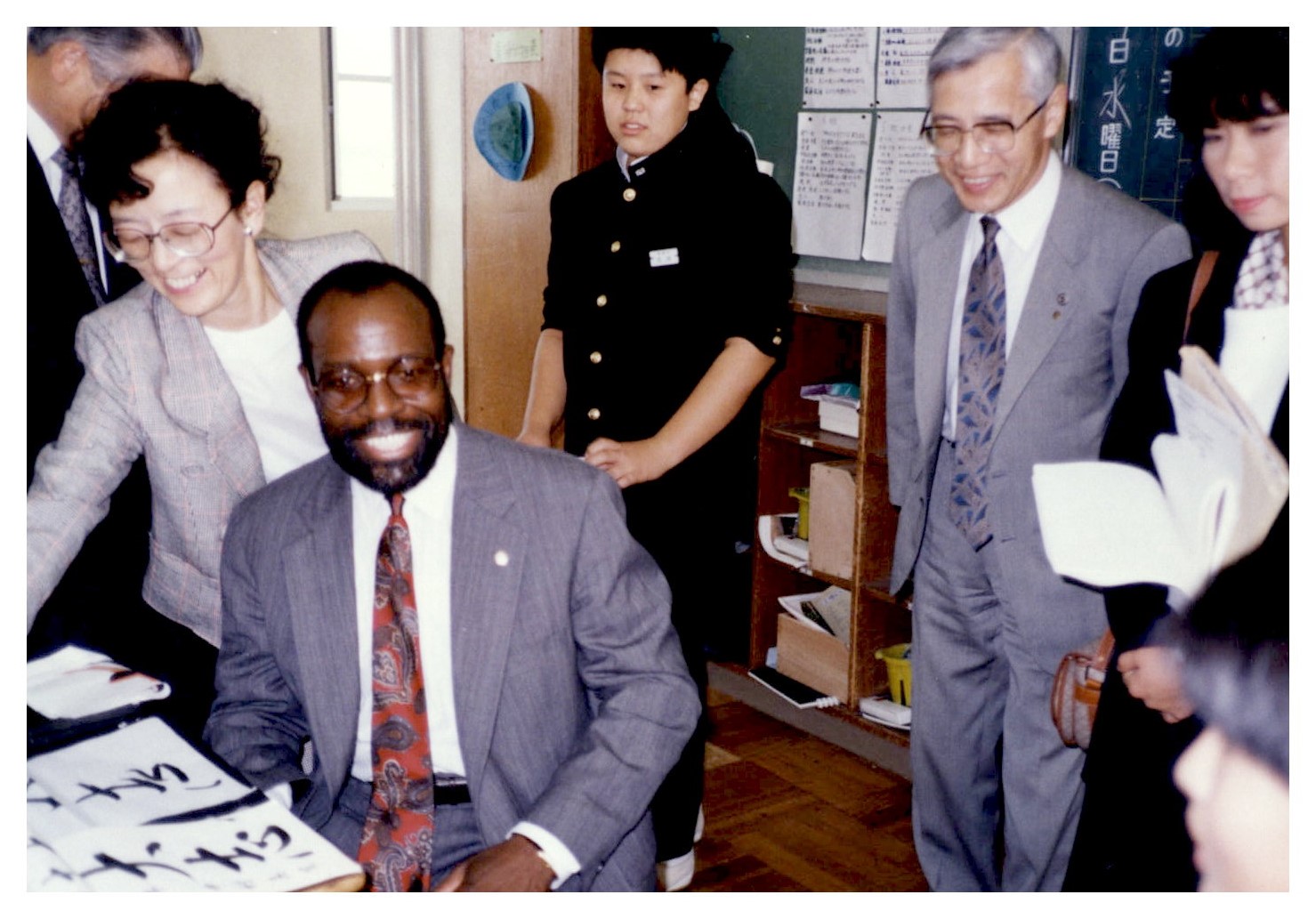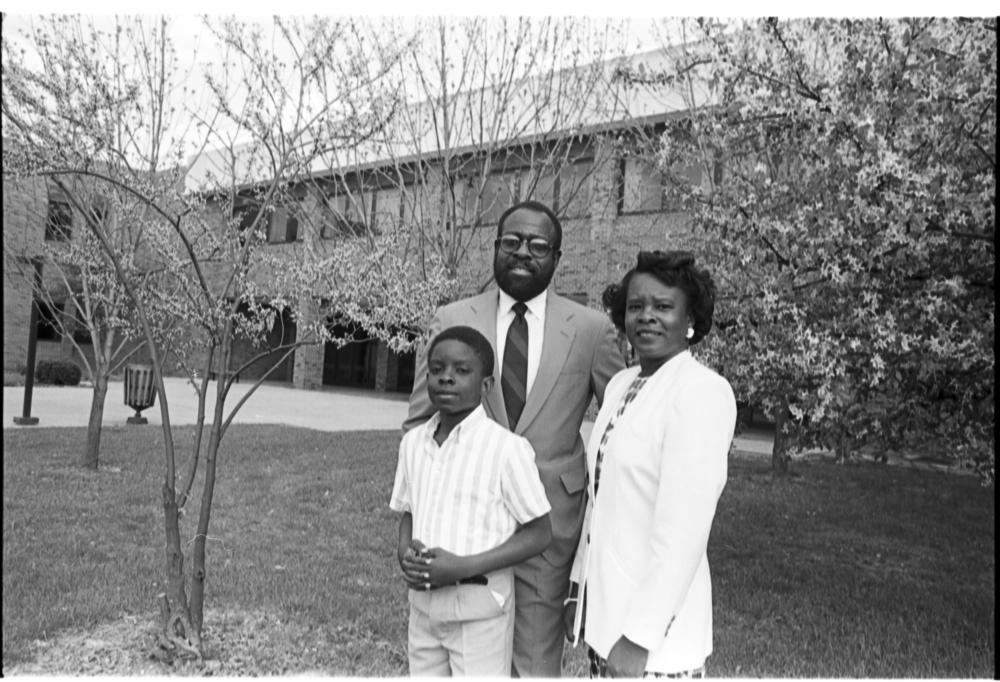Charlie Nelms is an unparalleled force in higher education. From his early days as a graduate student at Indiana University to his executive leadership roles at IU and beyond, Nelms has deeply affected the landscape of higher education in the United States. I had the absolute pleasure of processing the Charlie Nelms papers, 1967-2016 (Collection C701) at the University Archives. This collection of writings, correspondence, reports, publications, audiovisual recordings, and ephemera documents Nelms’ life as a great leader, activist, orator, and educator. The potential uses of this collection are expansive. Anyone interested in diversity and race in higher education, university administration, philanthropy, public speaking, community outreach, mentorship, or memoir writing should definitely make use of this collection.

Charlie Nelms was born in Crawfordsville, Arkansas (in the Arkansas Delta) in 1946. Nelms was one of eleven children born to subsistence farmers and community organizers. Throughout his career and in his publications today, Nelms has reflected on growing up in the Arkansas Delta during the Jim Crow era. Many of these reflections appear in the Charlie Nelms papers, especially in the “Speeches” series (my favorite part of the collection). These anecdotes provide a powerful context to understand just how important his leadership at IU has been. Nelms shared a couple such anecdotes at the Black History Month Closing Reception at IU in 2005:
“Growing up in the Delta Region of Arkansas at a time when African Americans weren’t as fully integrated into society as they are today, Negro History Week took on special significance for my rural classmates and me. Back then you seldom saw a black face on television. In fact, very few black people even owned a television set. Popular programs included Amos and Andy, the Friday night boxing match, church sponsored box suppers and Sunday worship. And yes, there was the mourner’s bench, getting religion and being baptized in the local creek. As for me, I got religion and was baptized in a local lake known as Buck Lake. As painful as our history is, including everything from the middle passage to slavery, emancipation, segregation, desegregation, and integration, it is a history that we dare not forget lest we repeat it.”
In a 2004 speech for the Black Alumni Weekend at University of Kansas, Nelms detailed:
“School was some place you went after the cotton crop was harvested;
Decided I wanted to make the world a better place rather than wasting my energy on being angry;
Although my parents were barely literate, they had an abiding faith in education; Mama and Papa told us to get a good education because no one could take it away from you;
I know from experience that education is the engine of opportunity. The research is clear, unless you are born rich, education is the best vehicle for improving the quality of life for individuals, communities, and nations.”
These are important points to understand Nelms’ narrative: he has long understood education as the core of a just, democratic society. The biographical note on his personal website, www.charlienelms.com, states it succinctly:
“While poverty and discrimination shaped Charlie as he sought to escape their grip, he has never felt the need to escape his responsibility for eradicating their pernicious effects. Charlie deeply believes that equity and excellence are core principles of democracy, and both are achievable.”
For his undergraduate degree, Nelms stayed close to home and attended University of Arkansas at Pine Bluff. After he received his B.S. in chemistry and agronomy there in 1968, he came to IU for his graduate work. He received an M.S. in higher education and student affairs in 1971 and an Ed.D. in higher education administration in 1977. The “Personal” series of the collection contains some materials from his graduate school days, such as newspapers and articles he used for research.
Like so many in academia, Charlie Nelms worked for many different universities throughout his career. After graduate school, Nelms worked at IU Northwest as a Professor of Education and Associate Dean for Academic Affairs from 1978-1984. The “Other Institutions” series of the collection includes teaching files, reports, and tenure dossier materials from his time at IU Northwest. The series also documents his next job as Vice President for Student Services at Sinclair Community College in Dayton, Ohio. In 1987, Nelms was hired as Chancellor and Professor of Education at IU East (in Richmond, Indiana). The Indiana University East series documents his time there from 1987-1994. The series provides a window into IU East at the time, including a campus dialogue on race in America, efforts to increase black student enrollment, and general strategic planning efforts. The series also contains materials (including a lovely photo album) from Nelms’ cultural ambassador trip to a Japanese primary school in 1991.

In 1994 Nelms left Indiana entirely to become Chancellor and Professor of Education at University of Michigan-Flint, a position he served in until 1998. His time in Flint is documented in the “Speeches” series through transcripts and notes from speeches he gave at area community organizations—including the Urban League of Flint, the Flint Neighborhood Coalition, the Flint Public Library, Flint Community Schools, and Mott Community College.
In 1998, Nelms became a Hoosier again and began serving as Vice President for Institutional Development and Student Affairs at IU Bloomington (he served in this role until 2007). During his service here, Nelms led a team of university administrators from across the country to design and implement 20/20: A Vision for Achieving Equity and Excellence at IU-Bloomington. 20/20 implemented a host of recommendations made by Nelms’ team on how IU could ensure the campus actively promoted a racially and ethnically diverse student, faculty, and administrative body. Nelms embodied the goals of this plan throughout his leadership on Bloomington’s campus, particularly through collaborative efforts to fund diversity initiatives. He worked with Purdue University to secure a $3 million National Science Foundation grant to increase minority enrollment in STEM fields; helped secure $26 million in funding to construct and dedicate the Neal-Marshall Black Culture Center; and launched the $5 million Jimmy Ross Endowment Fund for Diversity Initiatives. Materials across the Nelms papers document these efforts and more.

Nelms left Bloomington in 2007 to become Chancellor at North Carolina Central University (NCCU), a public, historically black university (or HBCU). The “Other Institutions” series contains notes, reports, and publications from his tenure at NCCU. Although he officially retired from NCCU in 2012, Nelms has remained an active author, public speaker, and consultant. His books include Lessons Taught, Lessons Learned (Bookmasters, 2004) and From Cotton Fields to University Leadership: All Eyes on Charlie (Indiana University Press, 2019). A portion of the proceeds from From Cotton Fields to University Leadership are donated to HBCU scholarships. In 2019, Nelms was awarded an honorary doctorate from IU for his exemplary leadership.
As I mentioned, my favorite part of the Charlie Nelms papers remains the “Speeches” series. Not only does it reveal the depth and breadth of his community engagement, it shows how Nelms has woven his commitment to justice and education throughout his career. Even beyond this series, however, the Charlie Nelms papers documents a life and career we should all aspire to. As our late winter doldrums trudge on, it’s easy to become stressed and disheartened with our workloads as university students and employees. I urge you to check out this collection when you need a reminder of why your education and work (here at IU, at another university, or anywhere, really) matters for the betterment of our democracy. If you are interested in viewing this collection, please feel free to contact us and set up an appointment!
Leave a Reply